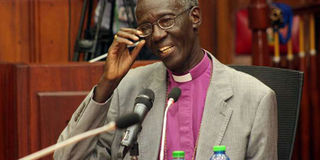Solution to institutional weaknesses would be to fix failed horizontal accountability

Eliud Wabukala, a former Anglican Archbishop, before the National Assembly’s Justice and Legal Affairs Committee at County Hall in Nairobi on January 5, 2017 to be interviewed for the position of Ethics and Anti-Corruption Commission chairman. PHOTO | DENNIS ONSONGO | NATION MEDIA GROUP
What you need to know:
- Fixing failed horizontal accountability would require more than one person’s character.
- Perhaps we should start by igniting other forms of accountability.
This should be food for thought for Dr Wabukala as he takes over at the EACC.
Whenever a new appointee comes to head the anti-corruption agency in Kenya, there is a rise in public expectation. The reason for this is usually the character that the person brings to the anti-corruption drive.
When Harun Mwau started off Kenya’s first specially designed anti-graft body, his penchant for litigation, especially against the then-all-powerful Kanu party, raised hopes that he would root out the vice. But his stint was largely forgettable.
Mwau was replaced by Justice (Rtd) Aaron Ringera. The fact that he was a legal technician made the public assume that he had the necessary skills to tackle corruption. But his exit was marked by loud lamentations from MPs, who wondered what his long, highly paid stint at the agency had resulted into.
Enter the loquacious P.L.O. Lumumba. His high-sounding rhetoric notwithstanding, he was soon kicked out. He would be known more for his eloquence against corruption than for action against the corrupt.
Philip Kinisu, who replaced the law professor, had an unexciting low public profile and would be kicked out soon after.
The appointment of retired Anglican archbishop Eliud Wabukala as the Ethics and Anti-Corruption Commission chairman will, therefore, raise public expectations once more as he brings with him a strong moral character borne out of a religious background.
NO ONE
True, Dr Wabukala has been chairing the National Anti-Corruption Campaign Steering Committee, but no one with his background has been at the helm of the EACC before. And, like others before him, his personal qualities cannot sustain the anti-corruption war.
Each of the prior directors came in with solid personal qualities. But because that is the wrong foundation on which to peg the anti-graft drive, they left no dent on the vice.
Perhaps the best approach to the anti-graft war would be an acknowledgement of the limits of the EACC. And one major obstacle would be the socio-economic and political environment in which it operates.
The EACC is among State agencies meant to promote what is usually called “horizontal accountability”, which basically entails ensuring that those charged with wielding and executing State power are answerable in the use of the power that they have.
However, horizontal accountability has failed massively in this country – largely because it sits in diametric opposition to Kenya’s political culture.
By retreating to their ethnic identities and defending "one of our own" every time an issue requiring accountability comes up, Kenyans reject horizontal accountability. On the other hand, Kenya’s governance, characterised as “competitive clientelism”, does not allow for the emergence and thriving of horizontal accountability.
PERSONAL USE
We have too many centres of power, each with the ability to extract "rents" from the public for their own personal use.
Unlike, for instance, Rwanda, which has a dominant centre of power that determines happenings across the country, Kenya has dispersed the State’s regulatory power and reining in all these players puts pressure on the accountability agencies.
The failure of horizontal accountability has negative implications for institutions such as the EACC. First, even if it were run by angels, they would still fail. Second, singling out weaknesses within institutions and fixing them using personal qualities may not work so long as the broader concept under which they operate fails.
The solution to institutional weaknesses would be to fix failed horizontal accountability. That would require more than one person’s character. Perhaps we should start by igniting other forms of accountability.
This should be food for thought for Dr Wabukala as he takes over at the EACC.
Gilbert Muyumbu is a governance and accountability adviser for the eastern and southern Africa region at a non-governmental organisation.




